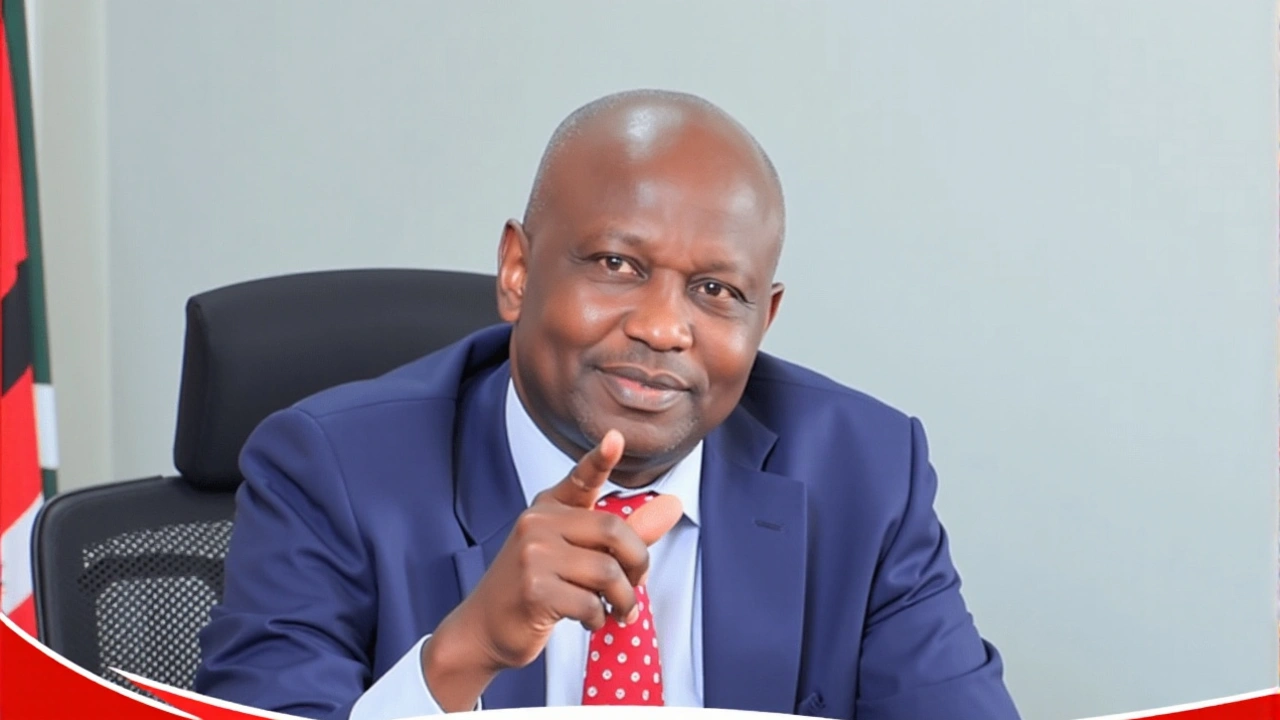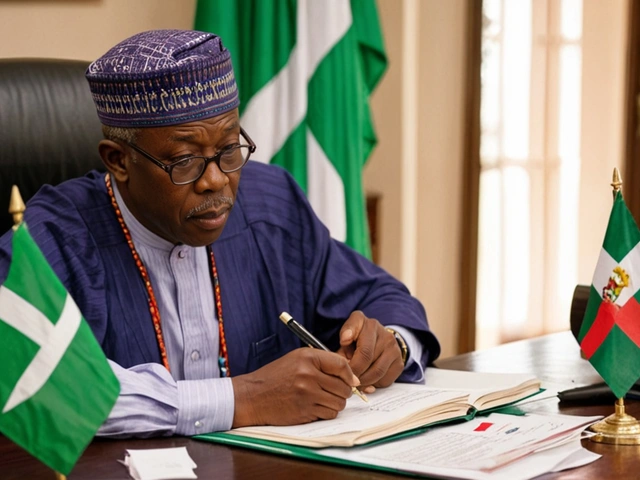Dire Warning: Kenyan Shilling Could Plunge to Ksh170 Per US Dollar, Says Moses Kuria
The former Cabinet Secretary Moses Kuria has sounded the alarm bells regarding an imminent and severe depreciation of the Kenyan shilling. In a recent statement, Kuria foretold that the shilling could tumble to a staggering Ksh170 against the US dollar within the next 19 days. This prediction, while alarming, serves as a critical call to action for both the country's leading policymakers and the general public.
Kuria has long been vocal about the fragility of Kenya's economic fundamentals. According to him, the underlying economic conditions are not robust enough to sustain the current exchange rate. One of his principal concerns revolves around the country's high interest rates. These elevated rates have had a dual-edged effect on the economy. While they have attracted foreign speculative capital, this type of capital is notorious for its volatility and could exit the market as soon as interest rates decline.
The Role of High Interest Rates
High interest rates in Kenya have created an environment rife with both opportunities and risks. On one hand, these rates have pulled in foreign investment looking to capitalize on the high returns. On the other, such investments are often fleeting and can lead to abrupt outflows, further destabilizing the local currency. Kuria highlights that this has discouraged private sector investment domestically, as the cost of borrowing becomes prohibitively high. Such a stifling environment ultimately hampers long-term economic growth and development.
Moreover, the high interest rates have posed a significant barrier to local businesses seeking expansion and growth. With borrowing costs elevated, many small and medium-sized enterprises (SMEs) find it challenging to secure the funding they need to scale their operations. This has led to limited job creation and stunted economic dynamism—a critical issue in a country with a young and rapidly growing population.
Trade Balance and Debt Servicing
Another critical issue that Kuria brings to light is the country's adverse trade balance. Kenya has been importing significantly more than it exports, leading to a trade deficit that puts additional pressure on the shilling. The negative trade balance means that more shillings are leaving the country to pay for imports than are coming in from exports, thus depleting the foreign exchange reserves.
Furthermore, Kuria points out the ballooning proportion of public revenue being funneled into debt servicing. This ever-growing commitment to meet debt obligations has left the country with fewer resources to invest in crucial sectors like healthcare, education, and infrastructure. The weight of these repayments siphons off potential funds that could otherwise be used for development projects, thereby hindering economic growth and destabilizing the currency further.
According to Kuria, these factors—when combined—create a perfect storm that could see the shilling plummet to unprecedented levels. The scenario Kuria paints is dire, urging immediate intervention to halt this downward spiral.
Urgent Call for Policy Overhauls
Kuria's warning is a stark reminder of the need for comprehensive and robust economic policies. He urges the government to take swift action to stabilize the currency and ensure long-term economic sustainability. One of his key recommendations is to diversify the economy and reduce its over-reliance on imports. By fostering local industries and encouraging exports, Kenya could potentially rectify its negative trade balance and strengthen the shilling.
Additionally, he advocates for policies that would make the business environment more conducive for local investments. Lowering interest rates could be a double-edged sword, but a balanced approach could stimulate domestic investment while not entirely discouraging foreign capital.
Kuria also recommends revisiting the country's debt management strategies. He suggests prioritizing repayments in a manner that does not choke off public sector investment. This could involve renegotiating terms with international creditors or exploring new, less extractive sources of funding.

The Broader Implications
The repercussions of such a sharp decline in the value of the shilling would be far-reaching. A weaker shilling could lead to higher inflation as the cost of importing goods increases. Everyday essentials, from food to fuel, could become more expensive, squeezing the pockets of ordinary Kenyans. The rise in prices would disproportionately affect those already living in poverty, exacerbating social inequalities and potentially leading to greater social unrest.
Moreover, the instability could deter foreign investment, both speculative and long-term, as investors seek safer, more stable economies. The resultant capital flight could further weaken the shilling, creating a vicious cycle of depreciation and economic instability.
While Kuria's warning is severe, it is not without merit. The complexities of international finance, domestic economic policy, and global market conditions all play a role in the shilling's value. As such, the situation requires a multi-faceted approach that considers short-term fixes alongside long-term strategies.
Final Thoughts
Kuria's stark warning about the Kenyan shilling's potential fall is a critical issue that the government cannot afford to ignore. The coming days will be crucial as policymakers scramble to find solutions that will stabilize the currency and set the country on a path to sustainable economic growth. The call to action is clear: immediate, robust, and well-rounded economic policies are not just desirable but essential to avert a crisis. All eyes will be on the government to see how they navigate this challenging economic landscape.







Posts Comments
PRATIKHYA SWAIN August 14, 2024 AT 21:08
This is fixable if we stop panicking and start acting.
Mark Venema August 15, 2024 AT 22:51
The structural issues Kuria highlights are real, but the timeline feels alarmist. Kenya's central bank has tools to manage volatility-foreign reserves, swap lines, targeted forex interventions. What’s missing isn’t just policy, but political will to implement it without populist interference. The real risk isn’t Ksh170-it’s the delay in addressing root causes like subsidy distortions and informal sector exclusion. Long-term stability requires deep institutional reform, not reactive rate hikes.
Deepti Chadda August 15, 2024 AT 23:16
Westerners always act like Kenya is some broken toy 😒 We’ve survived worse and we’ll survive this too 🇰🇪🔥
Derrek Wortham August 16, 2024 AT 03:56
Kuria’s just trying to stay relevant. He’s been out of office for years and still thinks his voice moves markets. Meanwhile, the real crisis is that 70% of Kenyans can’t even access a bank account. Nobody’s talking about that. They’re all obsessed with exchange rates like it’s a sports score. This isn’t economics-it’s theater. And the audience is getting tired of the performance.
Preeti Bathla August 18, 2024 AT 00:18
You think this is bad? Wait till the IMF shows up with their conditions again. They’ll tell us to cut bread subsidies while their consultants fly in on private jets. We’re not a country-we’re a loan collateral. And everyone here just nods and says ‘yes sir’ while their kids go to bed hungry. Ksh170? That’s just the price of silence.
Aayush ladha August 18, 2024 AT 03:12
Actually, the shilling’s been stable for months. This is just fearmongering to push some political agenda. Look at the data-not the headlines. The real problem is people who don’t understand forex but scream about it on Twitter.
Rahul Rock August 18, 2024 AT 22:37
There’s a deeper question here: Is currency stability an end in itself, or just a means to human dignity? If we fix the exchange rate but leave millions without jobs, clean water, or healthcare, have we really won? Maybe the real crisis isn’t the shilling’s value-but our collective failure to measure progress in anything but numbers.
Anjali Sati August 20, 2024 AT 10:11
Everyone’s talking about Ksh170 like it’s the end of the world. Meanwhile, the same people who panic about forex are the ones buying iPhones on hire purchase. Fix your own house before blaming the government.
Annapurna Bhongir August 21, 2024 AT 07:31
The debt is the problem. Not the rate. Not the trade. The debt.
MAYANK PRAKASH August 23, 2024 AT 05:37
I’ve seen this movie before. Every time the shilling dips, someone screams ‘collapse’ and the government panics. Then they raise rates, inflation spikes, and we all suffer. What we need is a national conversation-not a crisis narrative. Let’s stop treating economics like a horror flick.
Brian Walko August 23, 2024 AT 18:27
The suggestion to diversify the economy is correct but incomplete. Kenya needs to invest in digital infrastructure-not just physical roads. The informal sector is the engine of this economy, yet it’s ignored by policy. Mobile money, digital payments, and fintech have already proven they can stabilize cash flow. The real opportunity isn’t in export quotas-it’s in empowering millions of small entrepreneurs with access to credit, data, and markets. That’s how you build resilience-not by chasing forex targets.
Write a comment